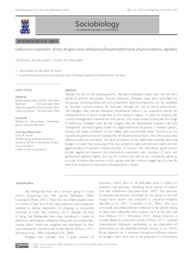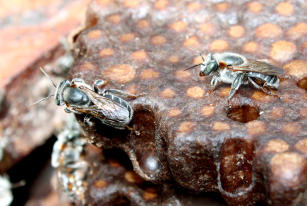Defensive repertoire of the stingless bee Melipona flavolineata Friese (Hymenoptera: Apidae).
Defensive repertoire of the stingless bee Melipona flavolineata Friese (Hymenoptera: Apidae).
Autoria: NUNES, T. M.; ZUBEN, L. G. von; COSTA, L.; VENTURIERI, G. C.
Resumo: Despite the fact that Meliponini bee lost their sting apparatus (stingless bees), they did not lose their ability to defend themselves. A variety of defensive strategies is described for the group, such as bitting and resin deposition. Defensive behaviours are usually mediated by chemical communication such as alarm pheromones. This study describe the defensive strategies of the stingless bee Melipona flavolineata Friese 1900 towards known pheromone sources, the head secretions of the robber bee Lestrimelitta limao and the mandibular gland extract of conspecifics M. flavolineata workers. The pheromones provoked different defensive reactions. The head secretions of the robber bee repelled returning foragers, elicited the enclosing of the nest entrance tube with batumen balls and agglomeration of workers outside of the box. In contrast, the mandibular gland extract elicited aggression towards the pheromone site, transport of resin and generalised agitated flights. The results confirm the mandibular gland as a source of alarm pheromone for this specie and also the chemical triggering of defensive response for the known cleptoparasite L. limao.
Ano de publicação: 2014
Tipo de publicação: Artigo de periódico
Unidade: Embrapa Amazônia Oriental
Observações
1 - Por padrão são exibidas publicações dos últimos 20 anos. Para encontrar publicações mais antigas, configure o filtro ano de publicação, colocando o ano a partir do qual você deseja encontrar publicações. O filtro está na coluna da esquerda na busca acima.
2 - Para ler algumas publicações da Embrapa (apenas as que estão em formato ePub), é necessário ter, no celular ou computador, um desses softwares gratuitos. Sistemas Android: Google Play Livros; IOS: iBooks; Windows e Linux: software Calibre.
Acesse outras publicações
Acesse a Base de Dados da Pesquisa Agropecuária (BDPA) para consultar o acervo completo das bibliotecas da Embrapa.


